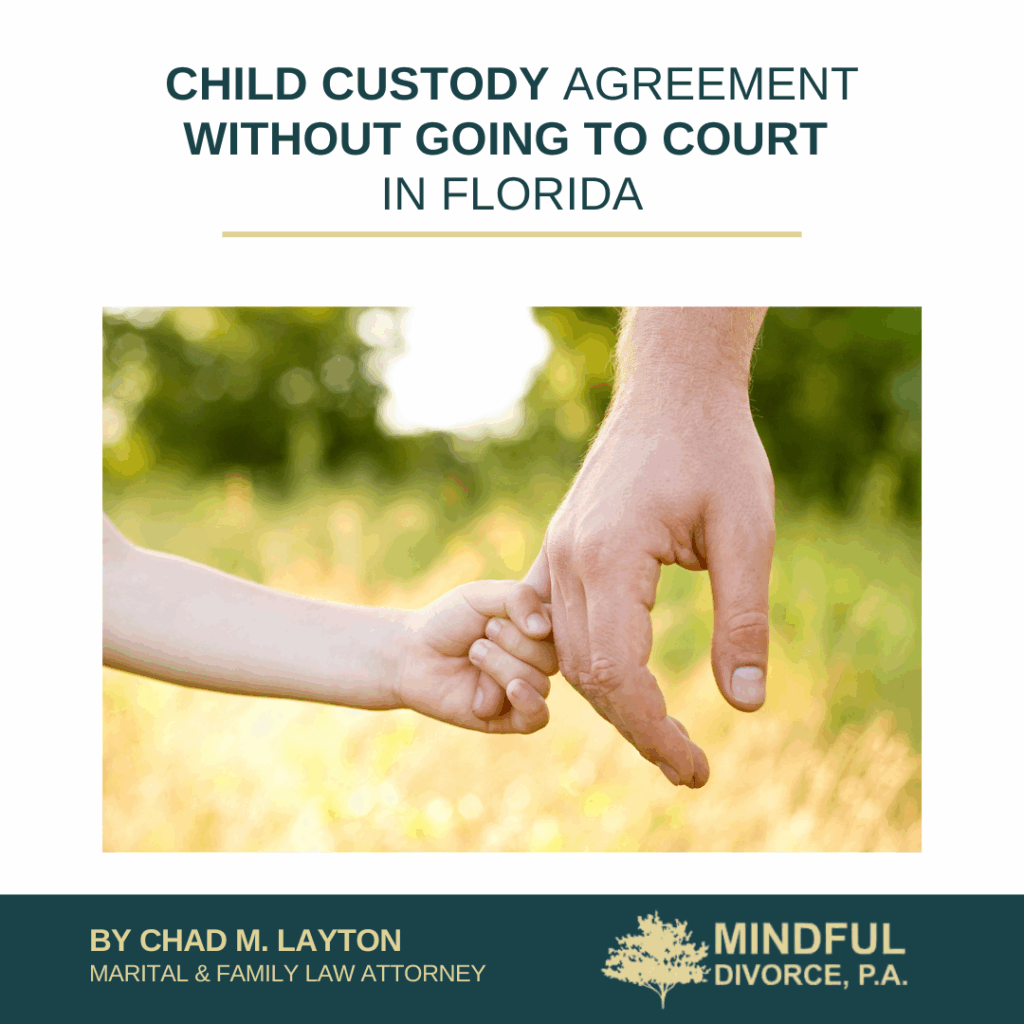
Co-parenting during a breakup can feel heavy, and a court fight often makes it worse. At Mindful Divorce, P.A., we offer transparent, fixed-fee services that keep costs clear so that you can focus on your child and your next steps.
This article explains how to establish a child custody agreement in Florida without going to court, as well as when a judge’s approval is still required. This information is educational only and does not constitute legal advice for your specific situation.
Child Custody Arrangements in Florida
Florida uses the terms “parental responsibility” and “time-sharing” instead of the old word “custody.” Parental responsibility encompasses major decisions affecting your child, including education and healthcare. Time-sharing is a schedule that shows when each parent has the child.
These ideas come together in a parenting plan, a detailed document that the court can approve under F.S.A. § 61.13(2)(b). A clear plan reduces conflict and provides both parents with a roadmap to follow.
Establishing Parental Rights Without a Court Order
Before any court order is in place, rights depend on whether the parents are married or unmarried. Knowing this upfront helps you avoid mistakes that create bigger problems later.
Rights of Married Parents
If the parents were married when the child was born, both typically share equal rights and duties for the child. Without a court order, there is no default schedule governing where the child lives or who makes decisions, which can lead to disputes arising quickly.
Because each parent has equal rights, one parent changing schools or moving with the child can trigger emergency issues. Putting an agreement in writing and then submitting it for a court order gives everyone clarity.
Rights of Unmarried Parents
For a child born outside of marriage in Florida, the mother is the natural guardian from the moment of birth. The biological father does not hold legal rights until paternity is established through court action under Fla. Stat. § 744.301(1). Until that happens, time-sharing and decision-making for the father are not recognized.
Steps for an unmarried father usually include filing a paternity case, arranging genetic testing if needed, and asking the court to approve a parenting plan. Many parents settle on a plan in mediation, then file it for a judge to sign.
Importance of Establishing Paternity
For unmarried fathers, paternity is the doorway to time-sharing and parental responsibility. It also connects the child to benefits such as health insurance coverage and potential inheritance rights.
Help is available through the Florida Department of Revenue programs, local clerks, or private testing services. A family law attorney can also prepare the necessary filings and a proposed parenting plan tailored to your family.
Creating a Child Custody Agreement Outside of Court
Plenty of parents reach solid agreements without a courtroom fight. The best starting point is a calm, child-focused talk that sets goals for schedules and decisions.
Negotiation and Communication
Short, respectful conversations are often more effective than lengthy arguments. Keep the focus on your child’s routine, school needs, and relationships with both households.
- Use written agendas for talks, such as school pickups or bedtime rules.
- Agree on tools for updates, such as a shared calendar or a co-parenting app.
- Speak in “we” terms, and avoid blame phrases that reopen old wounds.
If talks stall, press pause and try again after a quick break. Small wins build momentum for the bigger topics.
Parenting Plan Essentials
A parenting plan puts your agreements into a single, practical document. Florida law calls for details on time-sharing, daily tasks, how parents will communicate with the child, and who handles health care and school issues, see F.S.A. § 61.13(2)(b).
- Regular and holiday schedules, including overnights and exchanges.
- How decisions are made for health care, education, and activities.
- Communication rules, including phone time and access to the school portal.
- Logistics, including pickup spots, travel notices, and expense splits.
Well-defined plans reduce the need for emergencies, late-night texts, and mixed messages. Courts generally look favorably on clear and complete plans.
Alternative Dispute Resolution
Mediation involves a neutral third party to facilitate a mutually agreed-upon resolution. It is private, faster than a hearing, and allows parents to remain in control of the outcome.
Collaborative law is another option. Each parent has a lawyer, everyone meets in a series of team sessions, and the group solves problems without filing motions in court.
Formalizing the Agreement
Once you reach a consensus, have a family law attorney draft the parenting plan and related papers. Clean drafting prevents loopholes and headaches later.
Submit the plan to the court for approval. Once a judge signs it, the plan becomes an order that both parents are required to follow.
| Term | Meaning | Source in Law |
| Parental Responsibility | Decision-making authority for major issues | F.S.A. § 61.13(2)(b) |
| Time-Sharing | Schedule of when each parent is with the child | F.S.A. § 61.046(23) |
| Parenting Plan | Written plan that states responsibilities and schedules | F.S.A. § 61.13(2)(b) |
| Unmarried Mother as Guardian | Mother has custody of a child born out of wedlock until the order says otherwise | Fla. Stat. § 744.301(1) |
| Paternity Testing | DNA testing used in paternity cases | F.S.A. § 742.12 |
Considerations for Modifying Agreements
Parents can adjust a plan by mutual written agreement and then submit it for the judge’s signature. More significant changes, such as relocating far away or changing school choice, typically require a formal motion.
Any change still must serve the child’s best interests. Courts look at stability, school impact, and each parent’s track record with the plan.
Risks of Not Having a Court-Ordered Agreement
Verbal handshakes sound friendly, but they are hard to enforce if someone stops cooperating. Text threads and emails help a little, yet they do not replace an order.
Without a signed plan, confusion grows, late returns become a pattern, and travel or medical decisions turn into repeated standoffs. For unmarried fathers, wait for paternity leave rights to be unprotected during a critical time.
What to Do When a Parent Withholds a Child
Holding a child back without a court order can lead to serious legal consequences. Police often do not intervene without a warrant, so prompt legal action is usually necessary.
- Document the issue with dates, messages, missed exchanges, and witnesses.
- File a Petition to Determine Parental Responsibility and Time-Sharing, and request make-up time.
- Request temporary relief if necessary, including a temporary schedule and revised exchange rules.
- Use mediation to settle details quickly, then submit the agreement for a judge to sign.
If safety is at stake, consult a lawyer immediately about urgent filings and protective orders. Quick, calm action often prevents a small problem from escalating into a major issue.
When Withholding a Child May Be Justified
Keeping a child temporarily can be justified if there is an immediate risk to the child’s safety. Examples include intoxication at pickup, active abuse, or severe neglect.
Take prompt legal steps, such as filing for emergency custody or a protective injunction. Courts rarely excuse withholding rooted in punishment, control, or personal conflict.
How a Family Law Attorney Can Assist
A family law attorney can advise you on your rights, draft your parenting plan, and, if needed, stand up for you in court. Careful drafting ensures that your plan aligns with Florida statutes and avoids gaps that could lead to future disputes.
Legal guidance is useful even in low-conflict splits. With fixed-fee options at Mindful Divorce, P.A., you get transparent pricing and a plan you can follow.
Seeking Guidance for Your Child Custody Needs
At Mindful Divorce, P.A., we focus on clarity, stability, and practical agreements that prioritize the best interests of children. If you want to avoid going to court or need a court-approved plan, we are ready to help.
Feel free to call us at 561.537.8227 or visit our website to schedule a consultation. We welcome your questions and will work to protect what matters most to you.



